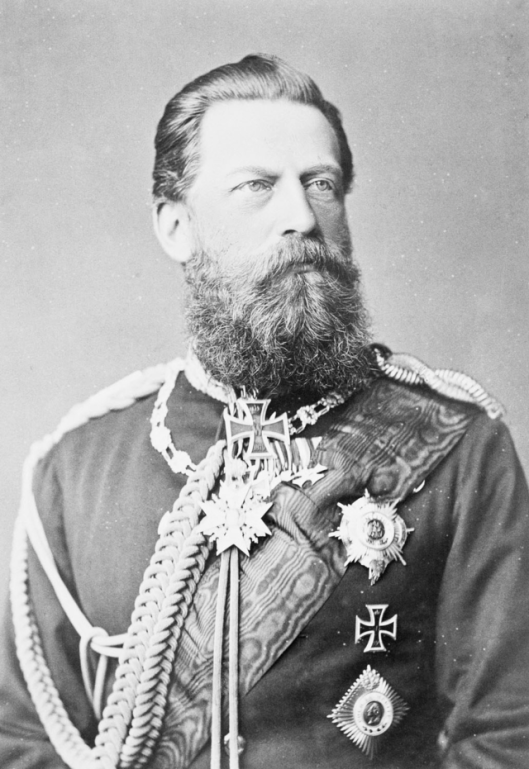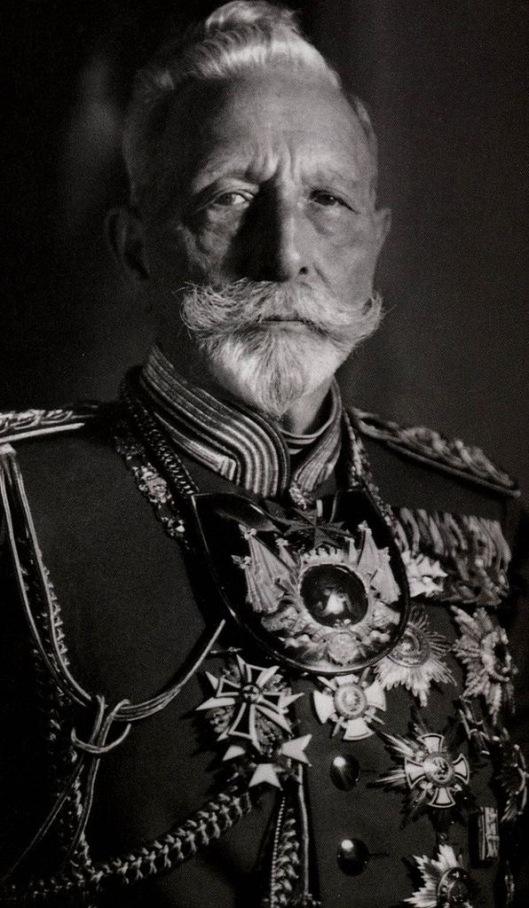Tags
Abdication, Chancellor of Germany, Crown Prince of Germany and Prussia, Duke Bernhard III of Saxe-Meiningen, Duke Charles Eduard of Saxe-Gotha-Gotha, Duke Ernst August of Brunswick, Duke Ernst II of Saxe-Altenburg, Duke Joachim Ernst of Anhalt, Friedrich Ebert, German Emperor, German Empire, Grand Duke Ernst-Ludwig of Hesse and by Rhine, Grand Duke Friedrich August II of Holstein-GottorpGrand Duke Wilhelm Ernst of Saxe-Weimar-Eisenach, Grand Duke Friedrich II of Baden, Grand Duke Friedrich-Franz IV of Mecklenburg-Schwerin, King Friedrich August III of Saxony, King Ludwig III of Bavaria, King of Prussia, King Wilhelm II of Württemberg, Minister President of Prussia, Prince Friedrich of Waldeck and Pyrmont, Prince Günther of Schwarzburg, Prince Heinrich XXVII, Prince Leopold IV of Lippe-Biesterfeld Prince Adolph II of Schaumburg-Lippe, Prince Maximilian of Baden, Prince Reuss Younger Line, Revolution, Spa, The German Emperor, Wilhelm II, Woodrow Wilson, World War I
As the first Word War was drawing to a close, throughout the month of November 1918, all 22 monarchs within the German Empire were either forced to abdicate, or stepped down of their own accord.
After the Oberste Heeresleitung stated the German front was about to collapse and asked for immediate negotiation of an armistice, the cabinet of Chancellor Georg von Hertling resigned on September 30, 1918.
Hertling, with the support of Conrad Haußmann, Oberst Hans von Haeften [de] and Erich Ludendorff suggested Prince Maximilian of Baden as his successor and to have Emperor Wilhelm II appoint Prince Maximilian as Chancellor of Germany and Minister President of Prussia.
When Maximilian arrived in Berlin on October 1st, Emperor Wilhelm II convinced him to take the post and appointed him as Chancellor of Germany and Minister President of Prussia on October 3, 1918. The message asking for an armistice went out on October 4th, hopefully to be accepted by President of the United States Woodrow Wilson.
In late October, Wilson’s third note seemed to imply that negotiations of an armistice would be dependent on the abdication of Emperor Wilhelm II. On November 1st, Prince Maximilian wrote to all the ruling Princes of Germany, asking them whether they would approve of an abdication by the Emperor.
On November 6th, Prince Maximilian urged Emperor Wilhelm II to abdicate. The Emperor, who had fled from Berlin to the Spa, Belgium OHL-headquarters, was willing to consider abdication only as German Emperor, not as King of Prussia.
Around November 4th, delegations of sailors had dispersed to all of the country’s big cities. By November 7th the revolution had seized all large coastal cities as well as Hanover, Braunschweig, Frankfurt on Main, and Munich.
On November 7th, Prince Maximilian met with Friedrich Ebert, leader of the Social Democratic Party of Germany, and discussed his plan to go to Spa and convince Emperor Wilhelm II to abdicate. He was thinking about Prince Eitel Friedrich of Prussia, Wilhelm’s second son, being the Regent.
However, the outbreak of the German Revolution in Berlin prevented Maximilian from implementing his plan. Ebert decided that to keep control of the socialist uprising, the Emperor had to resign quickly and that a new government was required.
In Munich, a “Workers’ and Soldiers’ Council” forced the last King of Bavaria, Ludwig III, to issue the Anif declaration. Bavaria was the first member state of the German Empire to be declared a Volksstaat, the People’s State of Bavaria, by Kurt Eisner of the USPD who asserted that Ludwig III had abdicated his throne via the Anif declaration.
Abdication and flight
Even though the uprising in Berlin had swelled into a revolution, Emperor Wilhelm II could not decide whether to abdicate. He recognized that he had likely lost his imperial crown, but he hoped to retain the Prussian kingship, believing that as monarch of two-thirds of Germany he could play a role in any new government.
This ultimately proved to be impossible. Emperor Wilhelm II had believed that he ruled as Emperor in a personal union with Prussia. Under the Constitution of the German Empire, however, the Empire was a federation of states under the permanent presidency of Prussia.
This meant that the Imperial Crown was legally tied to the Prussian Crown, and one crown could not be renounced without renouncing the other.
General Wilhelm Groener, then informed Emperor Wilhelm II that the army definitely would not fight to keep him on the throne. Army commander and lifelong royalist Paul von Hindenburg felt obliged, and with some embarrassment, to advise Wilhelm to give up the crown. It was only then that Emperor Wilhelm II accepted the fait accompli and agreed to give up the throne.
Hope of preserving the monarchy dwindled rapidly in the face of growing revolutionary unrest. With masses gathering in Berlin, Prince Maximilian unilaterally announced Wilhelm’s abdication of both crowns at noon on November 9, 1918, (which he would not officially confirm until November 28) as well as the renunciation of Crown Prince Wilhelm.
The proclamation, written by Theodor Lewald, the Under Secretary of State at the Imperial Home Office, read:
“His Majesty the Emperor and King has made the decision to renounce to the throne.
The Imperial Chancellor shall remain in office only until the matters related to the abdication of the Emperor, the renunciation of His Imperial and Royal Highness the Crown Prince to the thrones of the German Empire and of Prussia, and the establishment of the regency have been settled.
He intends to propose to the Regent the appointment of Deputy Ebert as Imperial Chancellor and the introduction of a bill for the election by universal suffrage of a constituent German national assembly, on which it would fall to determine the future definitive form of government of the German people, inclusive of the populations who should wish to request their entry into the Reich.
Berlin, 9 November 1918.
The Imperial Chancellor, Prince Max von Baden.”
There was a final mention which referred to the potential reunion of German-Austria to the rest of Germany, following the dissolution of the multi-ethnic Austro-Hungarian Empire.
Maximilian himself was forced to resign later the same day when it became clear that only Friedrich Ebert could effectively exert control.
MSDP co-chairman Philipp Scheidemann proclaimed the new “German Republic” from the Reichstag building to gathered crowds, while two hours thereafter Spartacist leader Karl Liebknecht proclaimed the “Free Socialist Republic of Germany” at the Berlin Palace.
Neither proclamation of a Republic was constitutional, and the political situation remained chaotic for several more months, with a short Civil War between radical leftist revolutionaries and the more moderate post-imperial social democrat government that would emerge victorious and form the Weimar Republic.
On November 9th, Emperor Wilhelm II boarded a train and went into exile in the Netherlands, which had remained neutral throughout the war.
Nevertheless, the proclamations and Wilhelm II’s abdication triggered a powerful domino effect: the same day a number of other princes stepped down, and within a week most monarchs in Germany had followed suit. The last to abdicate was King Wilhelm II of Württemberg on November 30, 1918.
Following the abdication of Wilhelm II on November 9, 1918 and German Revolution of 1918–1919, the German nobility and royalty as legally defined classes were abolished on August 11, 1919 with the promulgation of the Weimar Constitution, under which all Germans were made equal before the law, and the legal rights and privileges, and all following German Houses, titles, insignia and ranks of nobility were abolished.
The Emperor as Head of State held the title German Emperor (the style “Emperor of Germany” being deliberately avoided), and was simultaneously a Federal Prince as King of Prussia, the sovereign of its largest federal state. Of the princely heads of state, 4 held the title King (the Kings of Prussia, Bavaria, Saxony, and Württemberg), 6 held the title Grand Duke, 5 held the title Duke and 7 held the title Prince (i.e. Sovereign Prince, Fürst).
This is a list of German Monarchs of the Empire that abdicated in November of 1918.
Wilhelm II, The German Emperor, King of Prussia
King Ludwig III of Bavaria
King Friedrich August III of Saxony
King Wilhelm II of Württemberg
Grand Duke Friedrich II of Baden
Grand Duke Ernst Ludwig of Hesse and By Rhine
Grand Duke Friedrich Franz IV of Mecklenburg-Schwerin*
Grand Duke Friedrich August II of Holstein-Gottorp
Grand Duke Wilhelm Ernst of Saxe-Weimar-Eisenach
Duke Joachim Ernst of Anhalt
Duke Ernst August of Brunswick
Duke Ernst II of Saxe-Altenburg
Duke Charles Eduard of Saxe-Gotha-Gotha
Duke Bernhard III of Saxe-Meiningen
Prince Leopold IV of Lippe-Biesterfeld
Prince Adolph II of Schaumburg-Lippe
Prince Günther of Schwarzburg
Prince Friedrich of Waldeck and Pyrmont
Prince Heinrich XXVII, Prince Reuss Younger Line
* On February 23, 1918, Grand Duke Adolph Friedrich VI of Mecklenburg-Strelitz committed suicide, leaving his cousin Charles Michael of Mecklenburg-Strelitz as heir to the Strelitz throne. Being in Russia, however, Charles Michael did not assume the throne, and in 1918 he wrote to Grand Duke Friedrich Franz IV of Mecklenburg-Schwerin, who was acting as Regent in Strelitz, stating that he wished to renounce his rights of succession to Strelitz, though the letter was only received by Grand Duke Friedrich Franz IV in 1919 after the end of the German monarchies, so the issue of succession could not be resolved at the time.



































